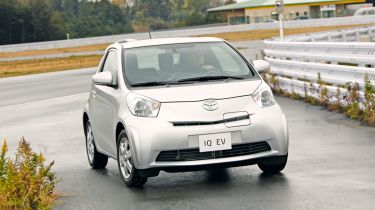Toyota iQ EV
We get behind the wheel of the electric Toyota iQ ahead of its launch next year

Toyota realises that small electric vehicles have limited appeal and are expensive to produce, so it’s capping the iQ EV to 1,000 examples. This is a shame, as it’s a competent effort that would be an ideal urban runaround. Next year’s Renault Clio-based Zoe EV may change that, bringing these cars into the public eye and encouraging infrastructure. If it does, Toyota is well placed to expand iQ EV production.
The idea of an electric Toyota iQ has been around for a while, but the company has only recently confirmed that 1,000 will be produced, with 140 going on test in Europe next year.
The car was actually designed to take battery power from the outset. The flat li-ion battery pack fits under the floor where the fuel tank normally sits, and there’s space under the bonnet for the inverter, electronics and gearbox.
Like most electric cars, the iQ EV leaps away from a standstill, but progress is painfully slow above 45mph. This makes it a great town car, but it’s not suited to motorways. The ride is a little harsh, yet it’s fun to drive, while the brakes, which feed power back into the batteries, have a consistent, linear feel.
The advanced battery allows a range of 53 miles. The motor produces 63bhp and 163Nm of torque – enough to take the 1,070kg iQ from 0-62mph in 14.3 seconds and on to a top speed of 78mph.
Outside, little sets the electric iQ apart from the petrol version except blue-edged badging, slightly altered front and rear grilles and a front hatch for the charging socket.
Inside, there’s a clever dash display that can either show the remaining range or the battery charge and power usage.







